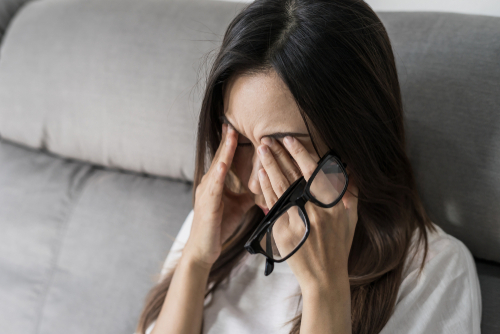Are There Treatment Options for Dry Eyes?

Do your eyes feel dry or irritated? These are common symptoms of a condition known as dry eye syndrome.
Your eyes rely on the tear film for lubrication and moisture to keep them wet, comfortable, and maintain vision. Tears are made up of oils, water, mucus, proteins, and antibodies secreted by glands found around the eye.
Sometimes, when your tears evaporate too fast, or your eyes don’t produce enough tears, you experience dry eyes. Keep reading to learn more about dry eyes and how to treat them!
What are the Symptoms of Dry Eyes?
Besides dryness and irritation, other symptoms of dry eye include:
- Itching
- Burning sensation
- Gritty feeling
- Blurry vision
- Pain
- Red eyes
Even with dry eyes, you may have watery eyes. Having watery eyes occurs when the eyes aren’t adequately lubricated, prompting the lacrimal glands to produce more tears.
The problem is that these tears have a lot of water but don’t contain enough lubricating qualities present in normal tears, which continues the cycle of dry eyes. Dry eyes mainly lead to excessive discomfort. But when left untreated, you may develop infections and corneal scarring.
Diagnosing Dry Eye
You need diagnostic tests to determine if you have dry eyes. Every patient’s case is unique and requires individual treatment. The evaluation and tests may include:
A Comprehensive Eye Examination
Your ophthalmologist will also note your lifestyle, symptoms, and health history. They may also examine the surface of your eyes and eyelids.
Tear Assessment
Your eye doctor will assess your tears, measuring their quality and volume to help determine if your tear quality and quantity are deficient.
From there, they will be able to tell how long it takes for your tears to evaporate and the rate at which your eyes secrete tears. After assessing your tears, your eye doctor will then check your tear sample for signs of inflammation.
Oil Gland Imaging
Oil gland imaging is necessary to evaluate how healthy your meibomian glands are. Over time, these glands can become blocked with thickened oils.
With the aid of a simple imaging test, you’ll have your glands checked for drop out, blockage, or truncation, showing the number of glands secreting oils and what the oil consistency is.
It’ll also inform your eye doctor if the oil can protect the tear film and keep your eyes properly lubricated.
Dry Eye Treatment Options
If you’re diagnosed with dry eye syndrome, there are treatment options available. At Short Hills Ophthalmology, we offer the following dry eye treatments:
Eye Drops
High-quality over-the-counter artificial tears can help alleviate mild dry eye symptoms. In addition, some prescription eye drops increase the eye’s ability to produce tears.
BlephEx®
BlephEx is a painless procedure that uses a micro-sponge on the edges of your lashes and eyelids to get rid of debris and bacteria. BlephEx® prevents inflammation of your tear glands and chronic dry eye syndrome.
LipiFlow
The LipiFlow treatment is quite effective for meibomian gland dysfunction (MGD). MGD is a condition that leads to blockages in your meibomian glands.
Blocked meibomian glands prevent them from releasing enough oil, causing dry eyes. LipiFlow involves applying massage and heat on the inner and outer eyelids to clear blockages.
Top of the Line Treatment for Dry Eyes
Dry eyes can cause discomfort and interfere with your everyday life. That’s why the doctors at Short Hills Ophthalmology specialize in treating dry eyes with the most innovative and cutting-edge technologies. Ready to get the relief you need from your dry eyes? Schedule an appointment at Short Hills Ophthalmology in Clifton and Short Hills, NJ, now!



